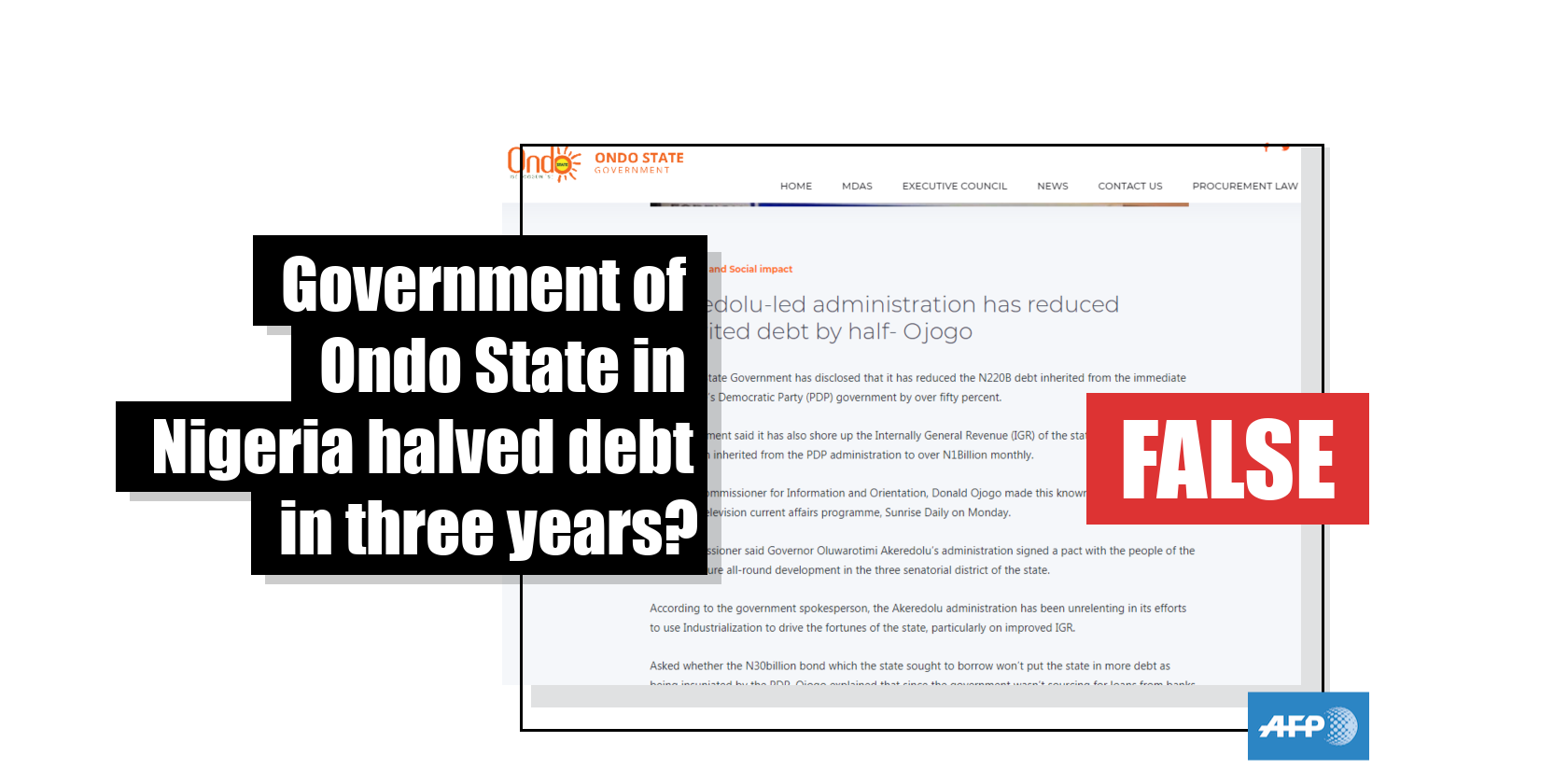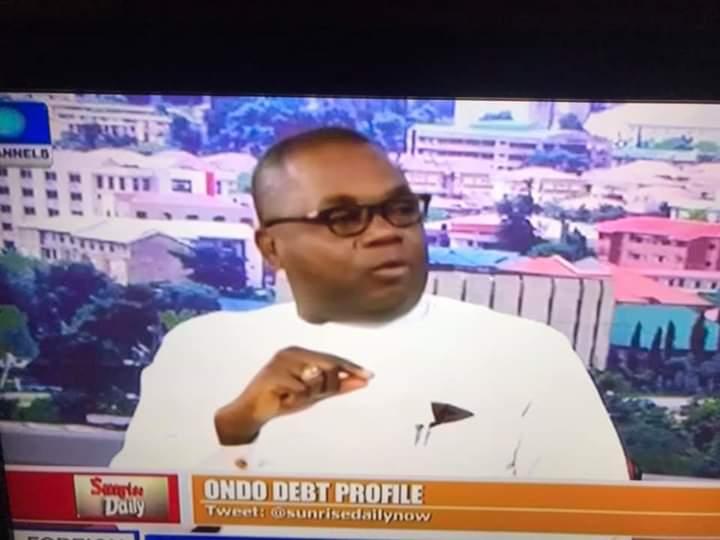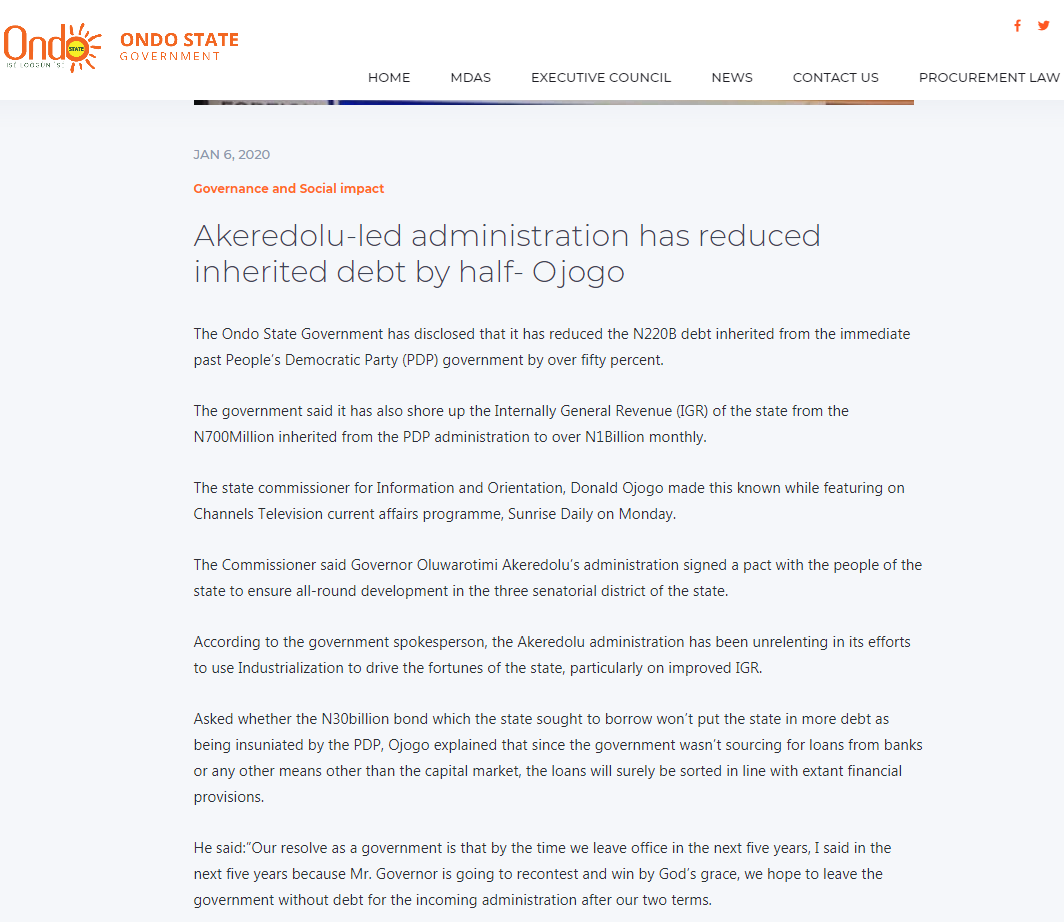
No, Ondo State in southwestern Nigeria has not reduced its debt by 50% in the past three years.
- This article is more than six years old.
- Published on January 9, 2020 at 13:55
- Updated on January 13, 2020 at 13:26
- 3 min read
- By AFP Nigeria, Segun OLAKOYENIKAN
The Commissioner of Information and Orientation in Ondo, Donald Ojogo, said Akeredolu’s administration has reduced the state’s debt by more than half from 220 billion naira ($716.6 million), since it took office in February 2017.
Ojogo, who was speaking on Channels Television in Lagos, also claimed that the government under the ruling All Progressives Congress has ramped up the state’s monthly revenue generation to a billion naira ($3.26 million) from 700 million naira ($2.28 million) under the previous government of the People's Democratic Party.

The story, since reported by some major Nigerian newspapers here, here, and here, has been spreading on social media as well as in traditional media. It has also attracted scrutiny over the state’s debt status.
The state published the story here on its website, while a government-funded media organisation, Ondo State Radiovision Corporation (OSRC), comprising a local radio and television station reported a similar version of the story here, and shared here on Facebook.

“The Ondo State Government has disclosed that it has reduced the N220B debt inherited from the immediate past People’s Democratic Party (PDP) government by over fifty percent,” OSRC reported.
Several posts were also shared alongside the claims on Facebook and on Twitter. We’ve achieved some of the posts here, here, and here.
The claims are false. Akeredolu’s administration inherited 68.32 billion naira ($222.5 million) in total debt and increased it by 16.8 percent to 79.77 billion naira ($259.8 million).
All references to total debt include domestic and external dollar-denominated debts, converted using Nigeria’s central bank official exchange rate of 307 naira per dollar.
The governor is left with barely a year to complete his first term of four years. But, with an election in the pipeline later this year that will determine his future, the Nigerian oil-producing state’s debt situation has become a major talking point.
What Akeredolu inherited and the situation now
Akeredolu was declared the winner in a November 2016 gubernatorial election held in Ondo.
AFP looked through the quarterly-updated database of Nigeria’s debt management office which details money owed by Nigeria's 36 states and capital city.
Ondo owed 68.37 billion naira ($222.7 million) in December 2016, comprising 53.16 billion naira borrowed from domestic lenders and 15.21 billion naira borrowed from external creditors.
In December 2017, the state’s total debt rose to 73.98 billion naira ($241.8 million) but dropped to 73.63 billion naira ($239.8 million) in December 2018.
The Nigerian debt agency is yet to release figures for December 2019. However, the latest statistics presented here and here show that Ondo’s total debt had increased to 79.77 billion naira ($259.8 million) in June 2019 -- this is 16.8 percent higher than the figure in December 2016.
What we know about Ondo's revenue generation
“The government said it has also shored up the Internally General Revenue (IGR) of the state from the 700 million naira inherited from the PDP administration to over 1 billion naira monthly,” reads an extract from the story shared on the government's website.
AFP checks on Nigeria’s statistics bureau show Ondo generated 8.68 billion naira ($266.6 million) revenue in 2016, equating to an average of 723.7 million naira ($2.36 million) every month.
However, the state’s monthly revenue generation increased to an average of 3.17 billion naira ($10.3 million) between January and June 2019 after it reported more than 19 billion naira ($61.9 million) as revenue for the period.
Copyright © AFP 2017-2026. Any commercial use of this content requires a subscription. Click here to find out more.
Is there content that you would like AFP to fact-check? Get in touch.
Contact us
